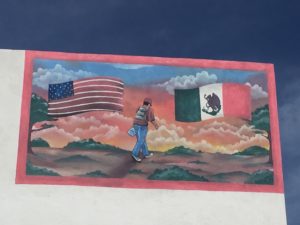
A drawing from a child that hangs in Sacred Heart Humanitarian Welcome Center. Photo: Jen Smyers / CWS
I just returned from a heart-wrenching trip to McAllen, Texas and Reynosa, Mexico. These communities face one another in the Rio Grande Valley, pierced by a jagged border of fencing, walls, levies and patrols. The trip was planned by National Justice for Our Neighbors, a United Methodist ministry that provides immigration legal services across the United States, and facilitated by local Methodist lay people and clergy who intimately know the realities of life along the border.
Upon arrival to the border, Border Patrol agents showed us videos fit for recruitment, boasted of high numbers of apprehensions and deportations and waxed poetic about their fellow agents who provided detained children chips and candy out of their own pockets. We ate lunch with immigration attorneys who described how Operation Streamline evades due process by forcing people to plead guilty in mass “trials” without access to translation, representation or an explanation of the long-term consequences. In a nearby, poverty-stricken area, immigrants’ rights leaders shared their table with us and demonstrated the importance of communities taking pride in who they are. And at the Sacred Heart Humanitarian Welcome Center, we met a family from Honduras cherishing the first shower, change of clothes and hygiene items they had been offered since fleeing the violence they faced at home. One little girl hugged a backpack given to her by the welcome center as we locked smiles for a brief moment.
This wasn’t my first trip to the border, and the facts and figures of the brokenness of our immigration system aren’t new to me, but I was still taken aback at the disparity between conversations around immigration policy in Washington, DC and the realities of people living along the border. My heart first pulled me to the Arizona / Mexico border more than 12 years ago, my time there a rigid distillation process from ignorance and disbelief, to shame and passion, to action and accountability. It was on that trip, while looking into a man’s eyes as he tearfully recounted how his wife and three young daughters had died in the desert, that I committed myself to advocating for policies that value people and families more than arbitrary borders and military-like force.
Over a decade after that first trip to the border, I walked this trip with more humility, more silence and more confusion than before. With the current backdrop of presidential candidates vying to out-hate each other, politicians on both sides of the aisle proving they’re willing to throw refugees and anti-trafficking laws under the bus and the Obama administration’s raids targeting Central American families and unaccompanied children seeking asylum, recognition of human dignity seems to have given way to a frenzy of sound bites and political posturing.
We met people on both sides of the border whose deep faith had led them to create shelters, dining halls, schools and trade training programs for migrants, deportees and people living in poverty. These programs were started by people of faith – Methodists and Catholics mainly – who are in relationship with people impacted daily by unjust economic, border and immigration policies. Together, they have recognized the needs in their communities and risen to the occasion – pitching tents, building shelters, collecting donations and installing solar ovens, rain barrels and solar panels to be sustainability-focused stewards. They tell each person that they will serve them, feed them and protect them while they sleep – regardless of who they are or what they believe.
All of these programs faced suspicion and even opposition from their governments at first, but in time government officials came to recognize that these ministries were filling a gaping hole and are needed if we are to remain a society that claims to be civilized and to value each person. In the words of Sister Norma from Sacred Heart, “We are restoring human dignity.” As I listened to stories about mayors, councils, education departments and hospitals that had “come around” to appreciating the importance of this work, it struck me as eerily familiar. It’s actually right now, in the process of writing this, that I realize why.
President Obama announced that enforcement operations will focus on “felons, not families” while his deportation numbers surpassed two million people, each one with a family. Secretary Jeh Johnson pledged that the U.S. will help the United Nations process more refugees from Central America, while in the same breath celebrating that the U.S. has helped Mexico return children back into the hands of traffickers and gangs. Senator Grassley pretended to care about unaccompanied children who were handed over to labor traffickers, despite the fact that he has crusaded for them to be deported back to the violence they fled. Countless politicians give to charity but will never be champions for policies that would lift people out of poverty or provide opportunities for people to rebuild their lives. Governors and Representatives have supported policies that would grind to a halt the resettlement of Syrian refugees, but still claim to be welcoming.
These politicians, these governments, are looking for the Church to save them from themselves. Maybe it’s their conscience, the fate of their souls or the examples they are setting for their children and grandchildren that they’re concerned about. Regardless, the Church cannot undo decisions made by people and institutions who abdicate their responsibilities in favor of expediency, wealth, praise and power. A Church can start a school, but it cannot compensate for the fear that overwhelms learning as a child’s parents are deported. A ministry can open a fair-trade coffee production, but it cannot change the fact that U.S. trade policies intentionally prevent Mexican farmers from making ends meet. A network of congregations can hire immigration attorneys to represent individuals as they make asylum claims, but they cannot represent children and adults prematurely turned away by Mexican border authorities trained by the U.S. to summarily return people back into harm’s way.
Don’t get me wrong – I’m not doubting or questioning the fact that with God, all things are possible. And I deeply value and affirm the role of the Church in advocating for policies that protect and against policies that exploit or ignore the vulnerabilities of migrants. But people in power who say that they value the work of the Church, politicians who claim their faith and administration staff who appreciate the role of the Church in helping people all must come to a reckoning that the very policies they enforce, excuse, fund and promote are contrary and counterproductive to the work of the Church. They are asking the Church to help the very same people broken by the system that they perpetuate and excuse. Not only are they committing a sin of omission by refusing to change inhumane systems, but they are continually choosing to be blind to injustice, to turn away from those in need, and to placate their role in it all by thanking the Church for making it more bearable for those who suffer most.
Certainly, the comfortable thing to do is for people in power to praise the Church and simply allow the underlying causes of suffering to continue, to not disrupt the status quo or take on the heavy lift of change. Some policy makers have tried to change things before, and it hasn’t worked out. But none of us can allow disappointment or jadedness to prevent us from thinking creatively about the opportunity for change. The Church does have an answer to that in Isaiah 58:6-12:
“Is not this the kind of fasting I have chosen: to loose the chains of injustice and untie the cords of the yoke, to set the oppressed free and break every yoke? Is it not to share your food with the hungry and to provide the poor wanderer with shelter—when you see the naked, to clothe them, and not to turn away from your own flesh and blood?….
“If you do away with the yoke of oppression, with the pointing finger and malicious talk, and if you spend yourselves in behalf of the hungry and satisfy the needs of the oppressed, then your light will rise in the darkness, and your night will become like the noonday. The Lord will guide you always; he will satisfy your needs in a sun-scorched land and will strengthen your frame. You will be like a well-watered garden, like a spring whose waters never fail. Your people will rebuild the ancient ruins and will raise up the age-old foundations; you will be called Repairer of Broken Walls, Restorer of Streets with Dwellings.”
It is only when people in power steadfastly use their positions to change oppressive and harmful policies that they will be working alongside the Church, and can then praise it with fullness of heart. And the Church has a role to play there as well, beyond charitable acts, places of safety and sustenance: we must commit to challenging those in power to grasp this reality and “do away with the pointing finger and malicious talk” as the Prophet Isaiah put it. We must never allow them to be comfortable in their empty praise and apathetic acceptance of the status quo. We must challenge them to join us in this vital work.
To support the interconnected work of economic development, border ministry, legal services, and immigrants’ rights advocacy, consider donating to Church World Service, National Justice for Our Neighbors, and the Methodist Border Friendship Commission.
Jen Smyers is the Director of Policy and Advocacy with the Church World Service Immigration and Refugee Program and serves as the Vice President of the Board of Directors for National Justice For Our Neighbors.

